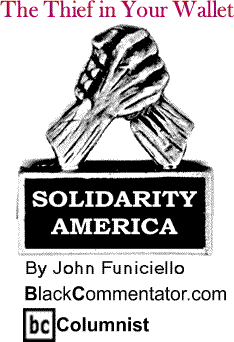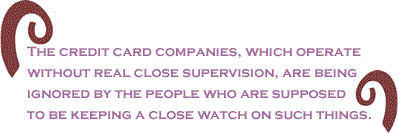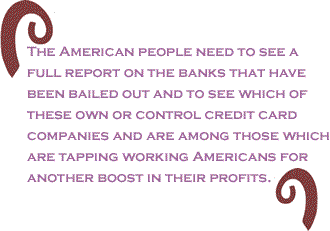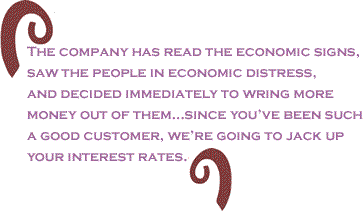
|
|||||||||||||||||||||||

|
|

Custom Search
|
|
 |
|
Now that the economy is in a free fall, caused in large part by those who measure their bonuses (now “incentive awards”) in the millions of dollars, the credit card companies are going to teach the common folk a lesson in thrift by tightening up credit. That simply means that they’ve taken a long look at the financial and economic state of America and made the wrenching decision to increase the interest rates. The credit card companies, which operate without real close supervision, are being ignored by the people who are supposed to be keeping a close watch on such things. You might ask, “Isn’t that what just happened with mortgage banks, other banks, hedge funds, and other companies which employ financial gimmickry? Why is there little or no oversight by the eagle eyes in Congress and the various state governments?” In the past few weeks, Capital One Bank notified its cardholders that it was hiking its interest rates. Not only was it raising the purchase rate, the bank told its customers, but it was increasing the cash advance rate and, God forbid, you should default—make two payments three or more days late within 12 billing periods—the bank will immediately move to put you at the top of the list, which means you pay the top rate, 29.4 percent. However, if you make on-time payments for 12 consecutive billing periods, your interest rate will be returned to a lower rate. The reason for all of this was given in a notice that is easily understood in the language, but not in its rationale: “Due to extraordinary changes in the economic environment, we’re reviewing our existing credit card accounts. Having considered these economic conditions, your account’s current purchase rate, and the length of time you’ve had this rate and account, we will be increasing your purchase rate. We’re also raising your cash advance and default rate.” To the average cardholder, that means the company has read the economic signs, saw the people in economic distress, and decided immediately to wring more money out of them…since you’ve been such a good customer, we’re going to jack up your interest rates.
There used to be laws that tried to limit usury, which was considered interest above the legal limit. There were periods in ancient times when any interest was usury. Some religious teachings prohibit the charging of interest today, to those within one’s own group or community. They might charge interest to those outside the group. But, throughout history, the charging of interest has presented a problem of fairness and justice. Usually, the payment of interest has fallen on those who are least able to pay or demand their right to be free from exploitation. The poor pay the highest price, whether it’s for goods or to borrow money. The percentage of their income the poor pay for the goods of daily life is much higher than the affluent or the rich pay as a percentage of their income. There have been laws and traditions throughout the ages, attempting to limit the amount that one can charge for lending money, but there have been exceptions, as there are today. States which have an interest limit on general borrowing can have a higher limit for credit cards. In New York, for example the upper limit for general lending is 16 percent (above that should be usury). Yet, there are other limits that are as high as 21 percent and, of course, Capital One is warning New Yorkers that it can charge interest as high as 29.4 percent. Protection for the credit card holder has come to a “buyer-beware” status. Government has let the market take care of the problem. If you don’t like what your company is charging you, find another company. In fact, that’s what Capital One has just told its customers: “If you decide not to accept these terms…You can choose to decline this change and close your account.” They could have added, “If you don’t like paying our interest rates, too bad. Kiss off!” No one likes to contemplate paying nearly 30 percent in interest, but a “default” as described above is easy for companies to arrange. Companies that lend money can jockey the billing system very easily. It used to be that a customer had nearly a month to pay, after receiving a bill. That seemed only fair, considering that paying the bill depended on a paycheck, a pension check, a Social Security check, a relief check, or a trust fund check, and on the timing of those checks. Now, one may get the credit card bill and have two weeks or even just 10 days to pay the bill. For those living check-to-check, that can be a big problem. It’s easy to see how anyone can get into the habit of paying the minimum and letting the total ride—and paying the 29.4 percent interest on the whole thing, which increases exponentially.
The people who can least afford to pay the excessive interest—usury that is no longer usury—are going to be nailed, again. Working men and women and the poor (many of them children) are going to be the surge in profits that credit card companies seek. The American people need to see a full report on the banks that have been bailed out and to see which of these own or control credit card companies and are among those which are tapping working Americans for another boost in their profits. Either the press or the government could do the research and investigation, but Congress has not appeared inclined to undertake that kind of consumer protection. And the press is a shadow of its former self. If America weren’t locked in a credit culture controlled by Corporate America, it might not be that much of a problem, but personal, credit card debt is a problem and the companies that own them are exacerbating the problem and making billions in the process. Ironic, isn’t it? Wage-earning women and men are bailing out the biggest companies in this national economic meltdown, yet the giants are coming back to try to squeeze more profit out of those same taxpayers, by manipulating interest rates and payment schedules. They’ve gotten away with it for too long. Congress needs to act, now. BlackCommentator.com Columnist, John Funiciello, is a labor organizer and former union
organizer. His union work started when he became a local president
of The Newspaper Guild in the early 1970s. He was a reporter for
14 years for newspapers in |
|
Any BlackCommentator.com article may be re-printed so long as it is re-printed in its entirety and full credit given to the author and www.BlackCommentator.com. If the re-print is on the Internet we additionally request a link back to the original piece on our Website. Your comments are always welcome. eMail re-print notice
If you send us an eMail message we may publish all or part of it, unless you tell us it is not for publication. You may also request that we withhold your name. Thank you very much for your readership. |
|
| |
|
| February
19, 2009 Issue 312 |
|
| Executive Editor: Bill Fletcher, Jr. |
| Managing Editor: Nancy Littlefield |
| Publisher: Peter Gamble |
| Est. April 5, 2002 |
Printer Friendly Version
in resizeable plain
text format or pdf
format. |
| Frequently Asked Questions |
 |

|
 |
 |
 |
| |
| |







































